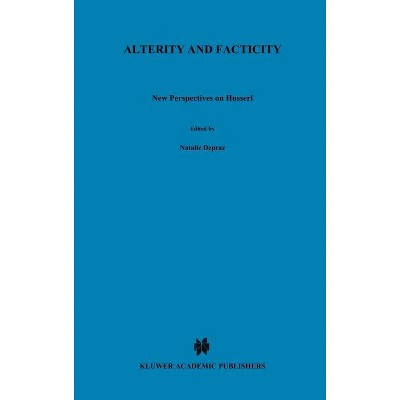About this item
Highlights
- Both volumes of this work have as their central concern to sort out who one is from what one is.
- About the Author: James G. Hart (b. 1936) did a Ph.D. at the University of Chicago after research in Munich on Hedwig Conrad Martius.
- 566 Pages
- Philosophy, Movements
- Series Name: Phaenomenologica
Description
About the Book
The first of a two-volume set whose central concern is to sort out who one is from what one is, this book focuses on transcendental-phenomenological ontology. It considers such issues as identity, individuation, substance and the afterlife.
Book Synopsis
Both volumes of this work have as their central concern to sort out who one is from what one is. In this Book 1, the focus is on transcendental-phenomenological ontology. When we refer to ourselves we refer both non-ascriptively in regard to non-propertied as well as ascriptively in regard to propertied aspects of ourselves. The latter is the richness of our personal being; the former is the essentially elusive central concern of this Book 1: I can be aware of myself and refer to myself without it being necessary to think of any third-personal characteristic; indeed one may be aware of oneself without having to be aware of anything except oneself. This consideration opens the door to basic issues in phenomenological ontology, such as identity, individuation, and substance. In our knowledge and love of Others we find symmetry with the first-person self-knowledge, both in its non-ascriptive forms as well as in its property-ascribing forms. Love properly has for its referent the Other as present through but beyond her properties.
Transcendental-phenomenological reflections move us to consider paradoxes of the "transcendental person". For example, we contend with the unpresentability in the transcendental first-person of our beginning or ending and the undeniable evidence for the beginning and ending of persons in our third-person experience. The basic distinction between oneself as non-sortal and as a person pervaded by properties serves as a hinge for reflecting on "the afterlife". This transcendental-phenomenological ontology of necessity deals with some themes of the philosophy of religion.
From the Back Cover
Both volumes of this work have as their central concern to sort out who one is from what one is. In this Book 1, the focus is on transcendental-phenomenological ontology. When we refer to ourselves we refer both non-ascriptively in regard to non-propertied as well as ascriptively in regard to propertied aspects of ourselves. The latter is the richness of our personal being; the former is the essentially elusive central concern of this Book 1: I can be aware of myself and refer to myself without it being necessary to think of any third-personal characteristic; indeed one may be aware of oneself without having to be aware of anything except oneself. This consideration opens the door to basic issues in phenomenological ontology, such as identity, individuation, and substance. In our knowledge and love of Others we find symmetry with the first-person self-knowledge, both in its non-ascriptive forms as well as in its property-ascribing forms. Love properly has for its referent the Other as present through but beyond her properties.
Transcendental-phenomenological reflections move us to consider paradoxes of the "transcendental person." For example, we contend with the unpresentability in the transcendental first-person of our beginning or ending and the undeniable evidence for the beginning and ending of persons in our third-person experience. The basic distinction between oneself as non-sortal and as a person pervaded by properties serves as a hinge for reflecting on "the afterlife." This transcendental-phenomenological ontology of necessity deals with some themes of the philosophy of religion.
Review Quotes
From the reviews:
"James G. Hart's ... presents the results of several decades of research on self- and personhood, combining transcendental phenomenology and existential philosophy. ... Hart has undoubtedly given us a thought-provoking study that enriches many ongoing debates and deserves increasing scholarly attention. I appreciate the breadth and insight of this work and heartily recommend it to anyone who wishes to learn more about who one is and about what it means to be a human being ... ." (Claudia Welz, Philosophy Today, 2010)
"James Hart offers the reader an insightful and comprehensive treatment of the perplexing manner in which we, each of us, are aware of our own selves. The book is comprehensive in two senses: in regard to the topics treated, and in regard to the authorities invoked. ... His book could serve as a reference work for someone who wished to explore this topic and wanted to know how it has been treated in philosophical and theological traditions other than his own." (Robert Sokolowski, Journal of Phenomenological Psychology, Vol. 41, 2010)
About the Author
James G. Hart (b. 1936) did a Ph.D. at the University of Chicago after research in Munich on Hedwig Conrad Martius. He taught at Indiana University, Bloomington (USA) from 1971-2001 in the Department of Religious Studies. His writings have been primarily in the area of phenomenology; his teaching was primarily in the philosophy of religion and peace studies. Since retirement he has spent his energy on philosophy and on reform of the criminal justice system.












